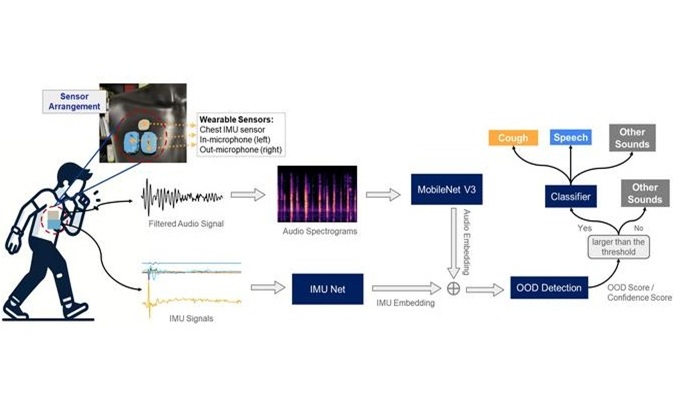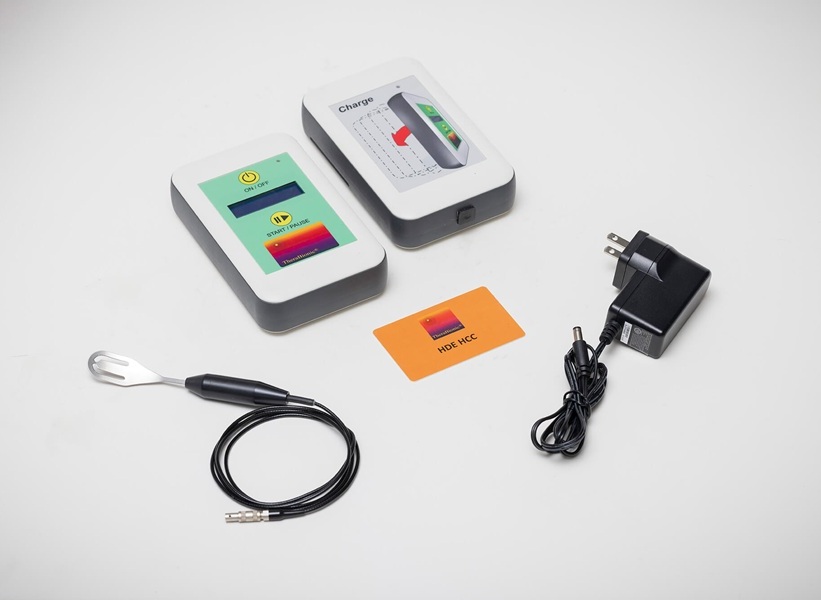World’s Smallest Insertable Cardiac Monitor Shows 10-Fold Increase in AF Detection
|
By HospiMedica International staff writers Posted on 17 May 2023 |

Every year, stroke affects over 795,000 individuals. A vast majority, more than 87%, of these strokes are ischemic, which are caused by blockages in the blood vessels supplying the brain. Those suffering from atrial fibrillation (AF) are five times more likely to experience ischemic stroke. Now, the findings of a clinical study have shown that stroke patients with both large and small vessel disease witnessed a ten-fold increase in AF detection over three years with the use of an insertable cardiac monitor (ICM), compared to those who received standard care without constant, long-term monitoring.
Medtronic plc’s (Dublin, Ireland) LINQ family of ICMs provides continuous, long-term monitoring for patients at risk of irregular heart rhythms. These patients may experience symptoms such as dizziness, heart palpitations, syncope (fainting), and chest pain, which necessitate ongoing monitoring or management. Late-breaking clinical data from the STROKE AF clinical study demonstrates that the LINQ ICM, the smallest ICM globally, detects 10 times more AF in ischemic stroke patients at three years compared to standard care. The STROKE AF study is a prospective, randomized study involving 496 large and small vessel stroke patients from 33 centers in the U.S. These findings reinforce the continuous of continuous cardiac monitoring in ischemic stroke patients.
These recent results build on the STROKE AF study 12-month primary endpoint results published in June 2021. Over the first year, AF was detected in 12.5% of patients in the ICM group, compared to 1.8% of patients who received standard care (which involves external cardiac monitoring such as 12-lead ECGs, Holter monitoring, telemetry, or event recorders). After three years, the rate of AF detection rose to 21.7% in the ICM group versus 2.4% in the control group, resulting in a statistically significant hazard ratio of 10 (95% CI 4.0-25.2, p<0.001). The study also showed that 67% of patients (31 out of 46) in the ICM group had clinically significant AF episodes lasting over an hour, while 88% of AF episodes were asymptomatic.
In addition, Medtronic has obtained market clearance from the U.S. Food and Drug Administration to incorporate the AccuRhythm AI algorithms into the Reveal LINQ ICM. Medtronic launched the AccuRhythm AI algorithms in 2022 to improve the accuracy of information received by physicians, thereby improving patient care. These AI algorithms were developed by Medtronic using its proprietary, diverse, and unbiased database of over a million electrocardiogram heart rhythm episodes. The company expects the AccuRhythm AI algorithms to reduce approximately 89.5% of AF false alerts and 80.2% of pause false alerts with Reveal LINQ, while maintaining true alerts at rates of 98.2% and 99.9%, respectively.
"Adding AccuRhythm AI to the thousands of Reveal LINQ ICMs currently implanted in patients globally is important as it will help reduce the data burden on many hospitals and clinics that still regularly use this device for monitoring their patients," said Alan Cheng, M.D., vice president and chief medical officer for Cardiac Rhythm Management Operating Unit, which is part of the Cardiovascular Portfolio at Medtronic.
Related Links:
Medtronic plc
Latest Critical Care News
- Origami Robots to Deliver Medicine Less Invasively and More Effectively
- Improved Cough-Detection Technology Aids Health Monitoring
- AI Identifies Children in ER Likely to Develop Sepsis Within 48 Hours
- New Radiofrequency Therapy Slows Glioblastoma Growth
- Battery-Free Wireless Multi-Sensing Platform Revolutionizes Pressure Injury Detection
- Multimodal AI to Revolutionize Cardiovascular Disease Diagnosis and Treatment
- AI System Reveals Hidden Diagnostic Patterns in Electronic Health Records
- Highly Sensitive On-Skin Sensing Monitor Detects Vitamin B6 and Glucose in Sweat
- Artificial Intelligence Revolutionizing Pediatric Anesthesia Management
- New Device Detects Tuberculosis DNA Directly in Exhaled Air
- New Menstrual Cup Could Detect Infections and Improve Diagnostics
- Engineered “Natural Killer” Cells Could Help Fight Cancer
- Faster Lymph Flow Predicts Better Response to Diuretics in Acute Heart Failure
- New Global Recommendations Aim to End Deaths from Postpartum Hemorrhage
- 'Flat-Line ECG' Indicates Poor Outcomes for Out-Of-Hospital Cardiac Arrest
- New Guidance to Improve Diagnosis and Management of Heart Failure During Pregnancy and Postpartum
Channels
Critical Care
view channel
Origami Robots to Deliver Medicine Less Invasively and More Effectively
Delivering medicine to ulcers or other internal sites often requires invasive procedures that can disrupt surrounding tissues and lengthen recovery times. Traditional magnetic actuators used in soft robotics... Read more
Improved Cough-Detection Technology Aids Health Monitoring
Coughing serves as an important biomarker for tracking a variety of conditions and can help monitor the progress of respiratory diseases or predict when someone’s asthma is being exacerbated.... Read morePatient Care
view channel
Revolutionary Automatic IV-Line Flushing Device to Enhance Infusion Care
More than 80% of in-hospital patients receive intravenous (IV) therapy. Every dose of IV medicine delivered in a small volume (<250 mL) infusion bag should be followed by subsequent flushing to ensure... Read more
VR Training Tool Combats Contamination of Portable Medical Equipment
Healthcare-associated infections (HAIs) impact one in every 31 patients, cause nearly 100,000 deaths each year, and cost USD 28.4 billion in direct medical expenses. Notably, up to 75% of these infections... Read more
Portable Biosensor Platform to Reduce Hospital-Acquired Infections
Approximately 4 million patients in the European Union acquire healthcare-associated infections (HAIs) or nosocomial infections each year, with around 37,000 deaths directly resulting from these infections,... Read moreFirst-Of-Its-Kind Portable Germicidal Light Technology Disinfects High-Touch Clinical Surfaces in Seconds
Reducing healthcare-acquired infections (HAIs) remains a pressing issue within global healthcare systems. In the United States alone, 1.7 million patients contract HAIs annually, leading to approximately... Read moreHealth IT
view channel
Printable Molecule-Selective Nanoparticles Enable Mass Production of Wearable Biosensors
The future of medicine is likely to focus on the personalization of healthcare—understanding exactly what an individual requires and delivering the appropriate combination of nutrients, metabolites, and... Read moreBusiness
view channel
Philips and Masimo Partner to Advance Patient Monitoring Measurement Technologies
Royal Philips (Amsterdam, Netherlands) and Masimo (Irvine, California, USA) have renewed their multi-year strategic collaboration, combining Philips’ expertise in patient monitoring with Masimo’s noninvasive... Read more
B. Braun Acquires Digital Microsurgery Company True Digital Surgery
The high-end microsurgery market in neurosurgery, spine, and ENT is undergoing a significant transformation. Traditional analog microscopes are giving way to digital exoscopes, which provide improved visualization,... Read more
CMEF 2025 to Promote Holistic and High-Quality Development of Medical and Health Industry
The 92nd China International Medical Equipment Fair (CMEF 2025) Autumn Exhibition is scheduled to be held from September 26 to 29 at the China Import and Export Fair Complex (Canton Fair Complex) in Guangzhou.... Read more














